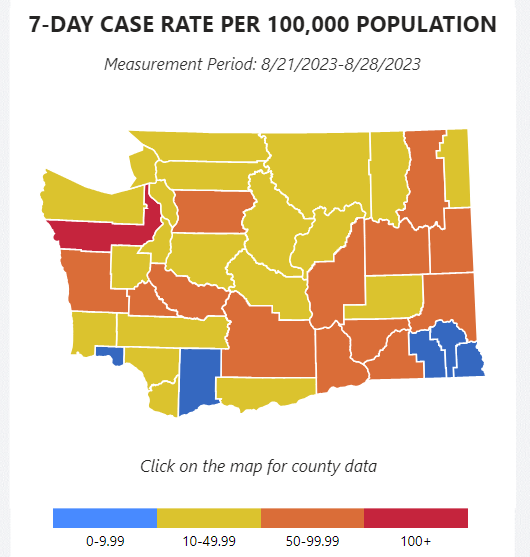
With COVID-19 rise in northwest, officials say new booster available soon
Listen
(Runtime 1:24)
Read
COVID-19 numbers are on the rise in the Inland Northwest, with Whitman and Latah counties both reporting 10 hospitalizations from the virus in the past week, according to the Centers for Disease Control and Prevention data tracker.
The county saw its biggest recent peak following the return of university students to campus, said Whitman County Public Health Director Chris Skidmore.
Whitman County’s seven-day average for COVID-19 cases per 100,000 was 69.3 as of September 12. However, Skidmore said, because most people test at home, the number is likely far higher.
“The cases that we’re seeing are not a clear picture of the true transmission rate,” he said. “I think it’s going to be anywhere between five, possibly 20 times the amount that we have as confirmed cases.”
Cases slightly decreased in the past week, Skidmore said, though he expects there may be another jump soon, following a sold-out home football game at Washington State University last Saturday and the recent county fair.
“I think the combination of those two events could add some more cases to our caseload but I don’t think we’ll see that until possibly the end of this week, maybe the beginning of next,” he said.
The increased COVID-19 cases come before the expected jump in respiratory diseases that are seen in the fall, such as influenza and RSV, Skidmore said.
“I expect that to occur generally just a little bit later, usually end of September, beginning October,” he said.
Newer variants of the virus seem to be highly infectious, but for most people are not especially dangerous, said Mike Larson, nurse for Public Health Idaho – North Central District.
“It’s very infectious, but it doesn’t appear to be impacting the overall population any differently than the others,” he said. “From my point of view, that’s really good.”
Though most healthy adults who get sick will recover on their own, Larson said the virus could still pose a significant risk to people with compromised immune systems, young children and seniors.
“It’s a good idea for people to be cautious. How cautious is totally dependent on where they are and what status their health currently is,” he said.
Skidmore said people planning large events should check community transmission levels and adjust accordingly.
“If they’re looking like they’re high, I would suggest wearing a mask, or maybe not even attending,” he said.
Anyone who is sick, whether with COVID-19 or something else, should stay home, Larson said, and everyone should be diligent about hand-washing to protect from COVID-19 and other diseases including RSV and influenza.
The public will soon be able to add a layer of protection for themselves with an updated COVID-19 booster, which was recommended by the CDC on Tuesday morning for anyone six months or older.
Both Pfizer and Moderna vaccines are approved. Individuals can receive either vaccine, regardless of previous vaccination status, if it has been at least two months since their last vaccination.
According to a news release by the Food and Drug Administration, the updated vaccines are expected to provide good protection against COVID-19 from the circulating variants. The FDA expects an updated vaccine may be necessary annually, similar to the seasonal influenza vaccine.
Local pharmacies do not yet have the vaccine in stock, though some stated they expected to have the vaccine by the end of September or early October.















